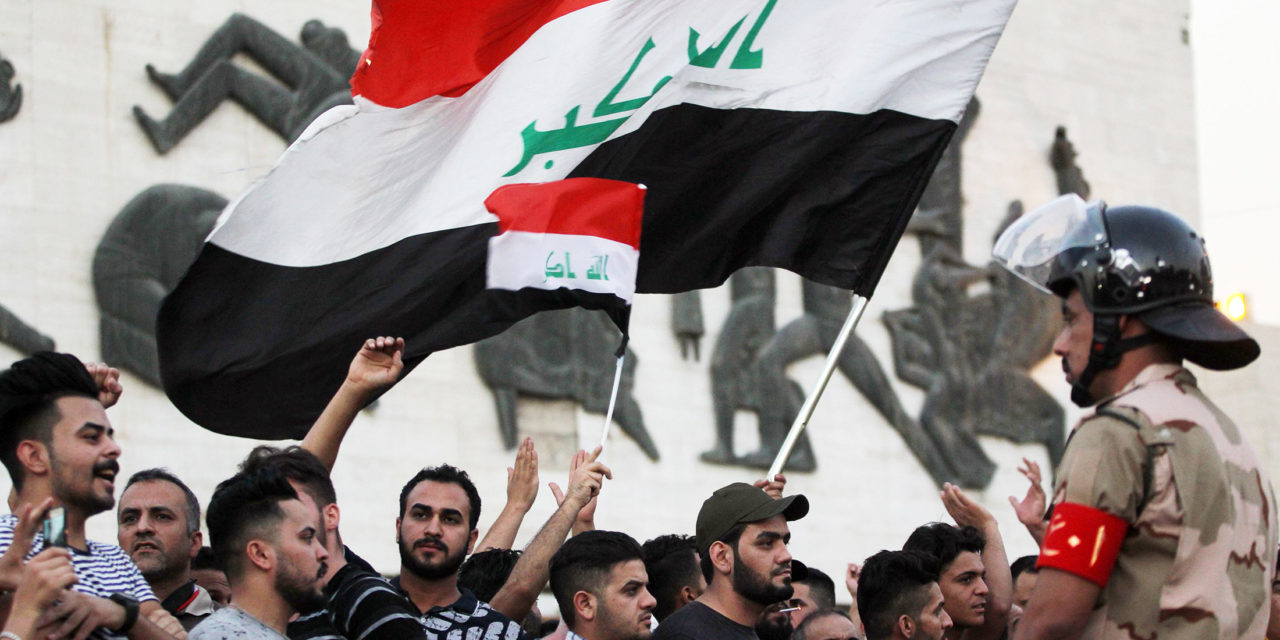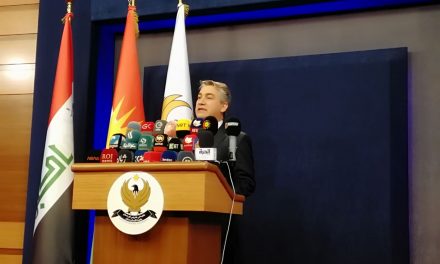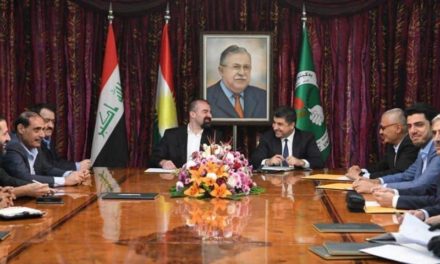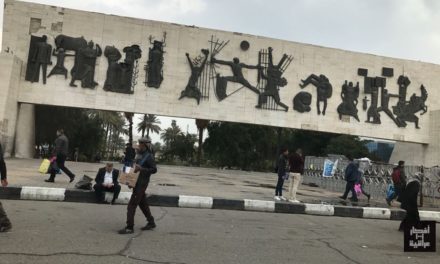(Protests in Baghdad on July 14. Ahmad Al-Rubaye/AFP)
Earlier this year, I wrote about how a commonly held view that frames a struggle between Islamists and advocates of a civil state in Iraq is overly simplistic because it fails to account for the significant overlap in the beliefs and objectives of these two seemingly disparate and irreconcilable factions.
A similar narrative has emerged over the past month and gained widespread traction with the rise of popular protests in the southern provinces of Iraq – one that frames the protest movement as a struggle between a corrupt ruling elite and ordinary citizens. The protests are ostensibly predicated on a rejection of the political status quo that is characterized by rampant corruption and mismanagement by ruling elites, who have amassed personal wealth and power at the expense of ordinary citizens who continue to live in squalid conditions; where basic services are not only lacking, but have failed to significantly improve over the past decade. Many protestors have called for these elites to be uprooted, while others have gone further and demanded an overhaul of the entire political system.
There is little reason to doubt that the majority of protestors on the streets today subscribe to this narrative, but an honest and holistic appraisal of Iraq’s ills should acknowledge that corruption exists not only among the ruling elite, but is endemic across the entire social spectrum.
Let me make this clear from the outset: this is by no means an attempt to vindicate the political class, whose greed and ineptitude over the past 15 years is one of the main reasons why Iraq has failed to meet the hopes and expectations of its people. This is however an attempt to correct the widespread perception that Iraq’s problems can be solved by simply replacing the existing political class with a new, supposedly untarnished generation.
Anyone who has spent any time living in Iraq will know that corruption, incompetence and mismanagement are pervasive throughout the state structure and its institutions. The reason why corruption is so deeply entrenched is because its beneficiaries are not limited to a small group of powerful elites, but rather, extend to a wide and deep set of patronage networks that include millions of ordinary Iraqis. The truth of the matter is, corrupt systems and practices are reinforced and sustained by much more than just a few hundred parliamentarians, politicians and senior officials.
Let me be clear: if you’re unemployed or live below the poverty line, you have every right to be angry. But if you’re related to one of the roughly 4 million people receiving a public sector wage, or one of the 2 million Iraqis on a state pension, or you’re a private businessman who has benefited financially from the country’s weak regulations, which side of the fence do you sit on?
Step inside any ministry in Iraq and you’ll find hoards of unproductive, incompetent, self-enriching free riders at every level. Few public sector employees are ever held accountable for their lack of productivity, and job security is nearly always guaranteed regardless of performance.
So when protestors complain about the dire state of the country’s electricity grid, it’s not enough to attack the electricity minister or the political party that he represents. At some level, even low ranking employees are to blame. And yet, these are often the same people attacking the government and the political class; they’re the same people who receive a reasonable monthly wage in exchange for little to no work.
If we genuinely want to fix Iraq’s problems, we have to take collective responsibility. Every single Iraqi can play his or her part. If you complain about the water crisis but leave your hosepipe running overnight to water your lawn, you’re part of the problem. If you complain about electricity but leave your air conditioning units on when you leave home, you’re part of the problem. If you’re a public employee making less than $1000 per month and yet you’re able to afford a brand new car, chances are, you’re part of the problem.
If you were to take these so-called ordinary Iraqis and put them in charge of a ministry’s procurement department, how much confidence would you have in their ability to perform in an honest and transparent manner?
I have previously argued that there is no evidence to suggest that secular politicians are any less corrupt that Islamists. In the same vein, I would assert that there is little reason to think that if the current crop of elites were replaced overnight with a new cohort of young civic activists, they would behave any differently.
It is very easy to criticize politicians and senior officials for their failings if you’ve never come close to experiencing the sort of power, influence and access to wealth that they do on a daily basis. There is a certain banality to corruption that one should understand. It takes an immense amount of personal fortitude and integrity to forego the opportunities to illicitly amass wealth and privilege, especially in a system with weak checks and balances. While there should be zero tolerance for any sort of corrupt practice among political elites, the same standard should apply to everyone.
Take for example the thousands of local and foreign NGOs that operate in Iraq. Many of them are vocal critics of the political elite; some are even actively involved in mobilizing protestors and organizing anti-government campaigns. Yet anyone who has spent any time interacting with the NGO community will know how utterly corrupt many of these organizations are. There is almost no accountability when vast sums of donor funds – earmarked for improving the lives of ordinary people – are squandered on failed projects. Nepotism is also rife, both within local and international organizations. Look at the corrupt hiring practices that exist within the United Nations agencies. It is common practice for the UN to post job vacancies online in order to comply with standard regulations, even though in many cases those positions have already been unofficially filled.
Saddam Hussein ran the country like his own personal fiefdom that was propped up by members of his own tribe. He created a police state by transforming the security forces into an apparatus that intimidates and controls the masses. If there truly was an Iraq that was divided between a small group of ruling elite, and the people, it was during Baath Party rule. The same cannot be said about today’s Iraq. Nearly everyone has at least one family member who is on the public payroll. That is why framing the current problems in the country as a struggle between “the people” and “the regime” is so utterly wrong, on so many levels.
There are no easy answers to tackling Iraq’s problems. But a good starting point is to admit that we are all responsible, in varying degrees, for Iraq’s woes. The current crop of ruling elites will not be around forever. We need to take heed from their experiences and ensure that future generations of leaders do not repeat the same mistakes.

Ali Hadi Al-Musawi
Ali Hadi Al-Musawi is an Iraqi analyst and contributing writer at 1001 Iraqi Thoughts.










